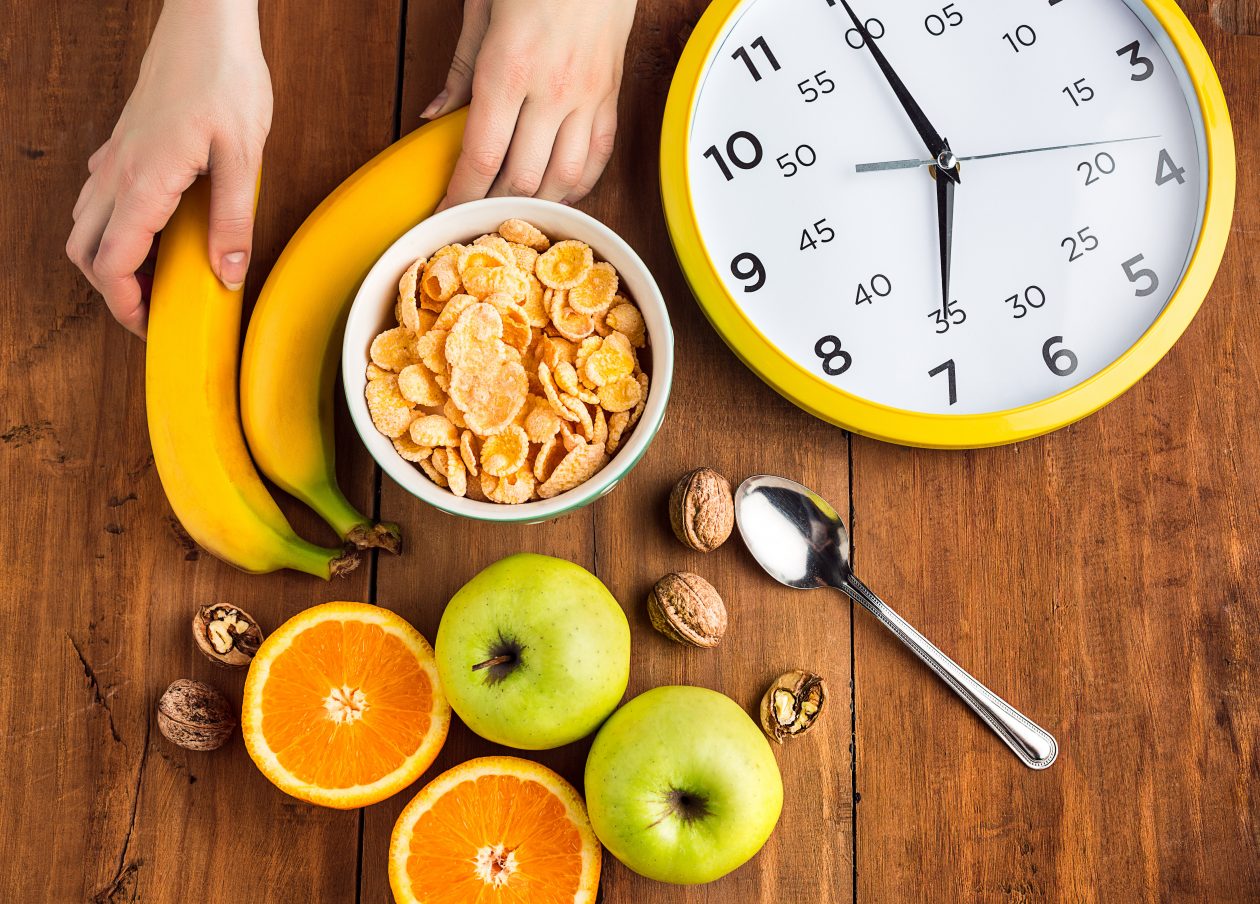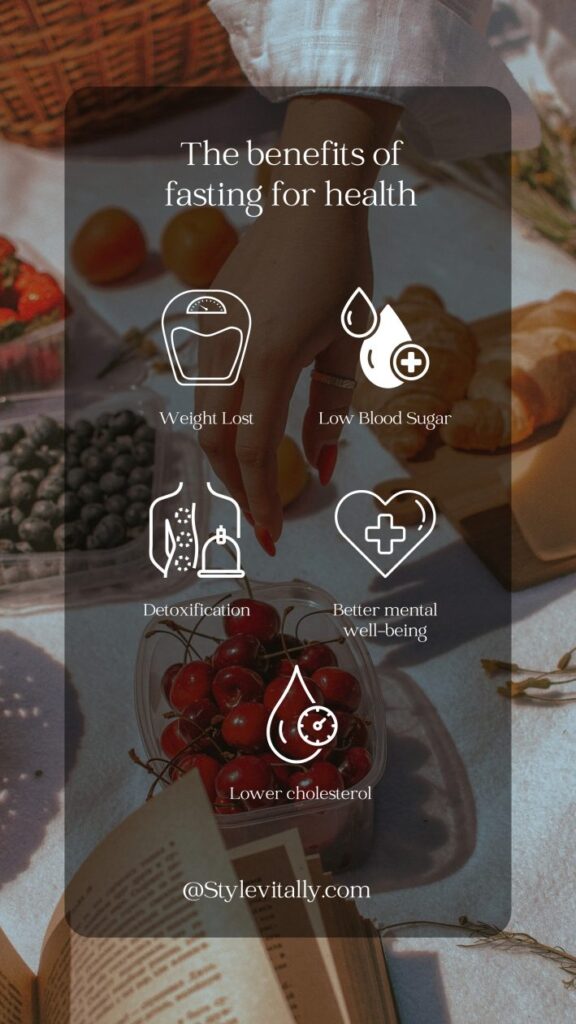Intermittent Fasting for Women Over 50
 / Discover more like this here: https://stylevitally.com/intermittent-fasting-for-women-over-50/?feed_id=6141&_unique_id=6602ce102a269&utm_source=&utm_medium=ycfemb83&utm_campaign=FS%20Poster
/ Discover more like this here: https://stylevitally.com/intermittent-fasting-for-women-over-50/?feed_id=6141&_unique_id=6602ce102a269&utm_source=&utm_medium=ycfemb83&utm_campaign=FS%20Poster
Introduction
Intermittent fasting, or IF, has become popular among women over 50 who want to improve their health and adequately control their weight. With its origins in antiquated customs and backing from modern studies, IF provides an adaptable and long-lasting approach to reaching well-being objectives. With women navigating the particular difficulties of aging, such as altered hormone levels and slower metabolism, intermittent fasting (IF) offers a chance to maximize health benefits and encourage vitality.
Due to the potential advantages of intermittent fasting for weight loss, metabolic health, and general well-being, its popularity among women over 50 is still growing. In contrast to conventional diets that frequently entail stringent calorie tracking or food limitations, intermittent fasting (IF) concentrates on when to eat instead of what to eat. By integrating fasting intervals into regular daily or weekly schedules, people can harness their body's innate capacity to burn fat for energy, enhancing metabolic function and more effective weight management.
Furthermore, intermittent fasting provides a comprehensive strategy for health that goes beyond mere weight reduction. According to research, IF may help with cellular repair, lower inflammation, and improve cognitive function, which is especially important for women over 50 who want to stay youthful. IF has the potential to be a comprehensive wellness strategy for women in this cohort, with benefits including improved cardiovascular health, mental well-being, and insulin sensitivity.
In the following parts, we'll examine intermittent fasting in more detail, consider its possible advantages for women over 50, and offer helpful advice on fitting IF into a balanced lifestyle. Women over 50 can use intermittent fasting as a solid tool to improve their health and vitality in the years to come by learning about its principles and potential.
Understanding Intermittent Fasting

One remarkably adaptable dietary strategy is intermittent fasting (IF), which alternates between periods of eating and fasting. Regarding eating, IF differs from standard diets that only concentrate on what foods to eat. This gives people a flexible and long-lasting approach to maintaining their health. IF provides a viable approach to managing weight and promoting general wellness for women over 50, taking into account their individual needs and preferences.
There are numerous approaches to intermittent fasting, each with unique advantages. For example, time-restricted eating is setting aside a specific window each day for eating, say eight hours, and fasting for a certain amount of time. The 5:2 approach calls for consuming 500–600 calories per day on two non-consecutive days while eating normally the other five days of the week. Furthermore, people who practice alternate-day fasting can eat anything they want on non-fasting days and consume a small amount of calories (around 25% of their daily requirements) on fasting days. These many strategies demonstrate how flexible IF is, enabling women over 50 to select a plan that fits their objectives and way of life.
One of the main benefits of intermittent fasting is its flexibility, which enables a variety of people, even women over 50, to adopt it. Unlike strict diet programs, IF is flexible enough to accommodate different schedules, tastes, and health objectives. If women over 50 want to lose weight, improve their metabolic health, or live longer, they can try several IF techniques to see which suits their needs the best. Women over 50 can benefit from intermittent fasting while leading satisfying and sustainable lives by adopting the proper strategy and progressively introducing IF into their daily routines.
Finally, intermittent fasting provides women over 50 a flexible and dynamic way to manage their health and well-being. Women can reap the benefits of intermittent fasting (IF) for weight management, metabolic health, and general well-being by comprehending its guiding concepts and techniques. Intermittent fasting gives women over 50 the freedom and customization to take charge of their health and thrive in the coming years.
Benefits of Intermittent Fasting for Women Over 50

Because it has a good effect on blood sugar levels and insulin sensitivity, intermittent fasting (IF) has excellent potential to improve the metabolic health of women over 50. According to research, IF can assist in controlling insulin levels, which is essential for maintaining blood sugar and avoiding insulin resistance—a prevalent issue among older people. Women over 50 who practice intermittent fasting may see improvements in their metabolic function and overall health and a lower risk of metabolic diseases like type 2 diabetes.
Apart from its metabolic advantages, intermittent fasting has drawn interest due to its possible contribution to weight control and fat burning in the abdominal area. According to studies, IF may accelerate weight loss by raising metabolic rate and fat burning during fasting times. An approach to intermittent fasting may be a valuable and successful way for women over 50 who frequently struggle with weight gain and abdominal obesity as a result of hormonal changes and slowed metabolism. This will help them lose extra pounds and improve their body composition.
Additionally, there is potential for intermittent fasting to improve heart health, lower inflammation, and improve cognitive function—all of which are essential factors for older women to take into account. Chronic inflammation has been linked to several age-related illnesses, such as cognitive decline and cardiovascular problems. Women over 50 may see improved cardiovascular and mental health and reduced inflammatory levels by adopting intermittent fasting into their lifestyle. This all-encompassing approach to well-being highlights the many advantages of intermittent fasting for enhancing older women's general well-being.
Women over 50 can benefit significantly from intermittent fasting, including enhanced metabolic health, reduced inflammation, weight control, heart health, and cognitive performance. Aging women can improve their general health and vitality by adopting intermittent fasting into their lifestyle, which will help them thrive as they age. As with any dietary intervention, speaking with a healthcare provider is encouraged to guarantee suitability and safety, particularly for people with underlying medical issues or special dietary requirements.
Muscle Maintenance and Protein Intake

Maintaining muscle mass is more important for women as they age to maintain their general health and functionality. It is critical to give measures that support muscle preservation top priority since sarcopenia, the age-related decrease of muscle mass and strength, can substantially impact mobility, balance, and independence. A novel strategy for preventing muscle loss in women over 50 is intermittent fasting, which encourages the retention of lean muscle tissue by deliberate nutrition scheduling and dietary modifications.
Consuming protein is essential for maintaining muscle health and halting age-related muscle loss. Essential amino acids are found in high-quality protein sources and are required for muscle growth, repair, and maintenance. It is crucial for women over 50 who are intermittent fasting to ensure they are getting enough protein during meal windows to maximize muscle maintenance and support general health. Lean meats, chicken, fish, eggs, dairy products, legumes, and tofu are foods high in protein that can be included in meals to satisfy daily protein needs and maintain muscular health.
The ideal amount of protein for women over 50 depends on several variables, including age, muscle mass, exercise level, and general health. Although the amount of protein required for each individual may differ, general guidelines indicate that one should consume 0.8 to 1.2 grams of protein per kilogram of body weight daily for the best maintenance of muscle. Making protein-rich meals and snacks a priority during periods of intermittent fasting can assist in maintaining muscle mass and reduce the risk of sarcopenia. In addition, older women's muscle preservation and functional capacity can be further improved by combining resistance training activities with a sufficient protein diet.
In conclusion, women over 50 must prioritize maintaining their muscle mass through sufficient protein consumption, especially if they plan to incorporate intermittent fasting into their lifestyle. Aging women can lessen the effects of sarcopenia and preserve physical function and vitality by realizing protein's role in maintaining muscle health and by adhering to recommendations for maximizing protein intake. Seeking advice from a medical practitioner or certified dietitian can offer individualized recommendations on protein consumption and dietary plans catered to specific requirements and objectives.
Safety Considerations and Precautions
For women over fifty, intermittent fasting (IF) has been shown to have several health benefits; however, before beginning an IF program, it is important to be aware of potential safety concerns and precautions. Although IF is generally safe for a large number of people, it might not be appropriate for everyone, particularly for those who have specific medical issues or health conditions. Particularly during the first adjustment period, it's critical to be aware of the possible adverse effects of insulin flush therapy (IF), including hypoglycemia (low blood sugar), exhaustion, dizziness, and irritability.
Women who suffer from hormonal abnormalities, such as PCOS or thyroid conditions, should proceed cautiously when attempting intermittent fasting and should speak with a healthcare professional first. Hormonal changes can potentially exacerbate the negative consequences of fasting by influencing blood sugar regulation and metabolism. Women who have a history of eating disorders or disordered eating patterns should exercise caution when contemplating IF because it can worsen pre-existing problems with food restriction or binge eating, or it can cause new problematic behaviors.
Women over 50 should get a thorough health evaluation and speak with a licensed healthcare provider, such as a doctor or registered dietitian, before beginning an intermittent fasting regimen. Based on a patient's medical history, current medications, and dietary preferences, healthcare professionals can analyze potential hazards, assess a patient's health, and make tailored recommendations. They can also provide advice on how to best consume nutrients, modify fasting regimens, and keep an eye out for any difficulties or negative consequences.
In conclusion, women over 50 may benefit significantly from intermittent fasting, but going cautiously and putting safety first is essential. A safe and successful IF experience requires knowledge of potential side effects, awareness of high-risk populations, and consultation with medical experts. Women can maximize the potential benefits of intermittent fasting while avoiding the danger of adverse effects on health and well-being by adopting the necessary safeguards and obtaining individualized assistance.
Tailoring Intermittent Fasting to Individual Needs
Women over fifty who consider incorporating intermittent fasting (IF) into their lives should customize the strategy to fit their unique requirements and preferences. One helpful technique is starting with shorter fasting windows and progressively extending them as your body adjusts. Taking it gradually reduces the possibility of adverse effects and makes the shift to fasting easier to handle. For instance, novices can start with an overnight 12-hour fast window and work up to 14 or 16 hours.
Long-term effectiveness depends on tracking developments and modifying IF regimens according to specific goals and responses from each person. Pay attention to your body's well-being, hunger cues, and energy levels during fasting. If you encounter negative consequences like exhaustion or agitation, you might lessen the duration of your fast or try varying the times of your meals. To ensure that your IF strategy aligns with your goals, you should periodically reevaluate your fitness and health objectives.
The secret to determining which IF strategy is ideal for each individual is to experiment. Other intermittent fasting methods include the 5:2 method, alternate-day fasting, and time-restricted eating. Investigating various IF protocols can help women over 50 choose the one that best suits their dietary needs and way of life. For instance, some people might find it simpler to fast every other day, while others prefer to have time-restricted eating periods every day.
To sum up, adjusting intermittent fasting to a person's specific needs entails experimenting with various IF techniques, tracking development, and beginning with shorter fasting windows. Women over 50 can maximize the benefits of intermittent fasting while limiting hazards or discomfort using customized approaches that modify the fasting protocol based on individual reactions and goals. Before beginning any new diet, speak with your doctor, particularly if you have any underlying medical issues or concerns.
FAQ Section
Q: What is the best intermittent fasting over 50?
A: The best intermittent fasting approach for individuals over 50 depends on lifestyle, health status, and personal preferences. Time-restricted eating, where meals are consumed within a specific window each day, is often a popular choice. However, it's essential to consult with a healthcare professional before starting any new dietary regimen, especially if you have underlying health conditions.
Q: How many hours should a woman over 50 intermittently fast?
A: The duration of intermittent fasting for women over 50 can vary based on individual goals and tolerance. A common approach is to fast for 14 to 16 hours daily, including overnight fasting. However, listening to your body and adjusting the fasting window is crucial to ensure it fits your lifestyle and health needs.
Q: Why is 16 hours the magic number for fasting?
A: The 16-hour fasting window is often recommended because it allows the body to enter a state of ketosis, which burns fat for fuel. This extended fasting period may promote weight loss, improve metabolic health, and increase cellular repair processes. However, the optimal fasting duration can vary depending on individual factors, and shorter fasting windows can still yield benefits.
Q: Which intermittent fasting is best for menopause?
A: Intermittent fasting can benefit menopausal women by helping to manage weight, regulate blood sugar levels, and improve metabolic health. Time-restricted eating and the 16/8 method, restricted to an 8-hour daily window, are commonly recommended approaches. However, individual needs and preferences should be considered when choosing the best method.
Q: How much weight can a 50-year-old woman lose in a month?
A: The weight a 50-year-old woman can lose in a month through intermittent fasting varies depending on starting weight, calorie intake, and activity level. Generally, a safe and sustainable rate of weight loss is 1 to 2 pounds per week. However, focusing on overall health and well-being is essential rather than solely on the number on the scale.
Q: Does coffee break a fast?
A: Consuming black coffee during intermittent fasting is generally acceptable and does not significantly impact fasting benefits. However, adding sugar, milk, or cream to coffee can break a fast by stimulating an insulin response, and opting for plain black coffee or herbal tea while fasting is best to avoid disrupting the fasting state.
Q: What is the best intermittent fasting window to lose belly fat?
A: No specific fasting window is guaranteed to target belly fat exclusively. However, many individuals succeed with time-restricted eating or the 16/8 method, as it promotes fat loss throughout the body. Consistency, a balanced diet, and regular exercise are essential to achieving and maintaining a healthy weight, including reducing belly fat.
Q: How do I eat enough protein while intermittent fasting?
A: Consuming adequate protein is essential for maintaining muscle mass and supporting overall health while intermittent fasting. Focus on including lean protein sources such as poultry, fish, tofu, eggs, and legumes in your meals during eating windows. Additionally, consider incorporating protein-rich snacks like nuts or Greek yogurt to help meet your daily protein needs.
Q: What can I drink while fasting?
A: While fasting, staying hydrated by drinking plenty of water throughout the day is essential. Additionally, black coffee, unsweetened tea, and plain sparkling water are acceptable beverages during fasting periods. However, it's best to avoid sugary, flavored, and alcoholic drinks, as they can break the fasting state and interfere with fasting benefits.
Conclusion
A viable strategy for women over 50 looking to improve their health and well-being is intermittent fasting (IF). Women in this group may have different advantages from fasting periods, such as better metabolic health, better control over their weight, and enhanced cognitive performance. Furthermore, IF has been demonstrated to improve heart health and potentially lower inflammation, addressing frequent aging-related issues.
Women over 50 thinking about intermittent fasting must go cautiously and customize their strategy to suit their unique requirements and preferences. It is advised to speak with a healthcare provider before beginning an IF program, particularly for people who have underlying medical issues. Additionally, a healthy and long-lasting fasting routine can be ensured by paying attention to your body and making adjustments as necessary.
In conclusion, women over 50 who want to maximize their health and well-being may find intermittent fasting a flexible and successful approach. Women in this group can use IF's advantages and experience enhanced general health and vigor in later life by thoughtfully and individually implementing it into their lifestyle. Dietary strategies must prioritize balance, moderation, and individualization for long-term success and well-being.
Reference
Duenke, Ken. 2008. “Older Women, Not Men, Have a Hard Time Maintaining Muscle Mass - the Source - Washington University in St. Louis.” The Source. March 26, 2008. https://source.wustl.edu/2008/03/older-women-not-men-have-a-hard-time-maintaining-muscle-mass/.
https://www.facebook.com/WebMD. 2021. “What to Know about Intermittent Fasting for Women after 50.” WebMD. WebMD. March 22, 2021. https://www.webmd.com/healthy-aging/what-to-know-about-intermittent-fasting-for-women-after-50.
Aly, S. M. (2014). Role of Intermittent Fasting on Improving Health and Reducing Diseases. International Journal of Health Sciences, 8(3), V. https://doi.org/10.12816/0023985
Morales-Suarez-Varela, M., Sánchez, E. C., Peraita-Costa, I., Llopis-Morales, A., & Soriano, J. M. (2021). Intermittent Fasting and the Possible Benefits in Obesity, Diabetes, and Multiple Sclerosis: A Systematic Review of Randomized Clinical Trials. Nutrients, 13(9). https://doi.org/10.3390/nu13093179
Yuan, X., Wang, J., Yang, S., Gao, M., Cao, L., Li, X., Hong, D., Tian, S., & Sun, C. (2022). Effect of Intermittent Fasting Diet on Glucose and Lipid Metabolism and Insulin Resistance in Patients with Impaired Glucose and Lipid Metabolism: A Systematic Review and Meta-Analysis. International Journal of Endocrinology, 2022. https://doi.org/10.1155/2022/6999907
Leonard, Jayne. 2020. “Six Ways to Do Intermittent Fasting.” Medicalnewstoday.com. Medical News Today. April 16, 2020. https://www.medicalnewstoday.com/articles/322293.
https://stylevitally.com/intermittent-fasting-for-women-over-50/?feed_id=6141&_unique_id=6602ce102a269&utm_source=&utm_medium=ycfemb83&utm_campaign=FS%20Poster
Comments
Post a Comment